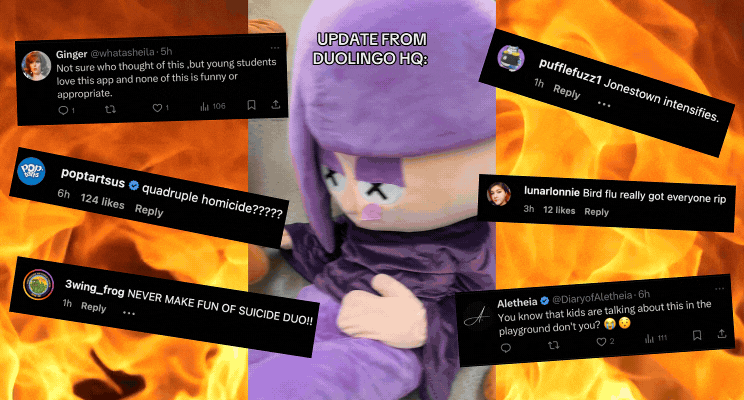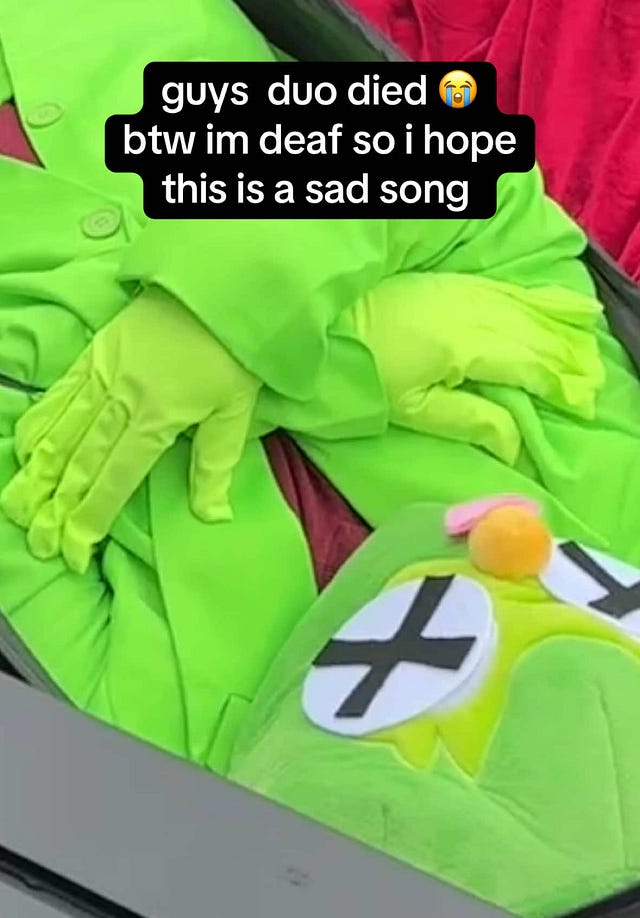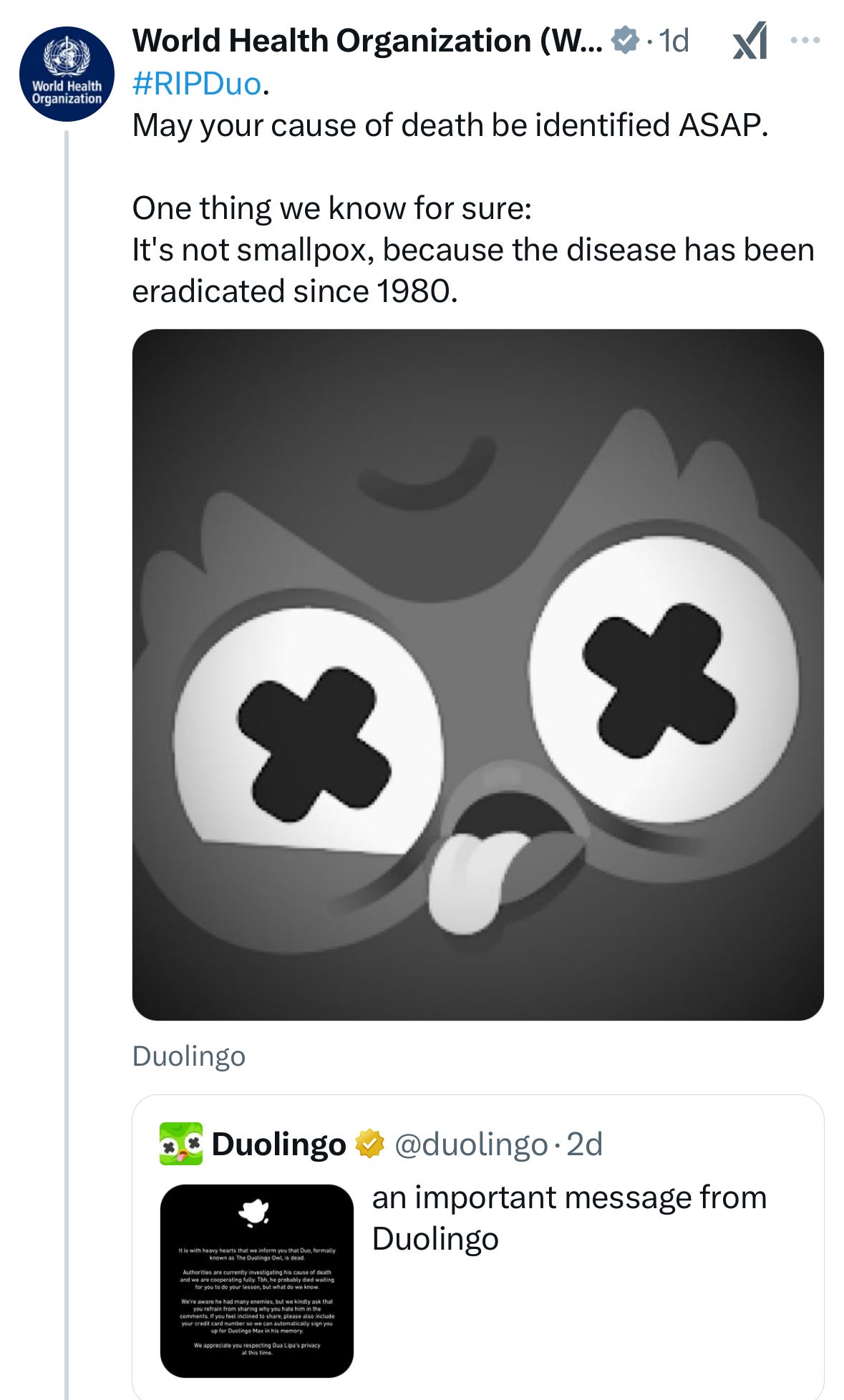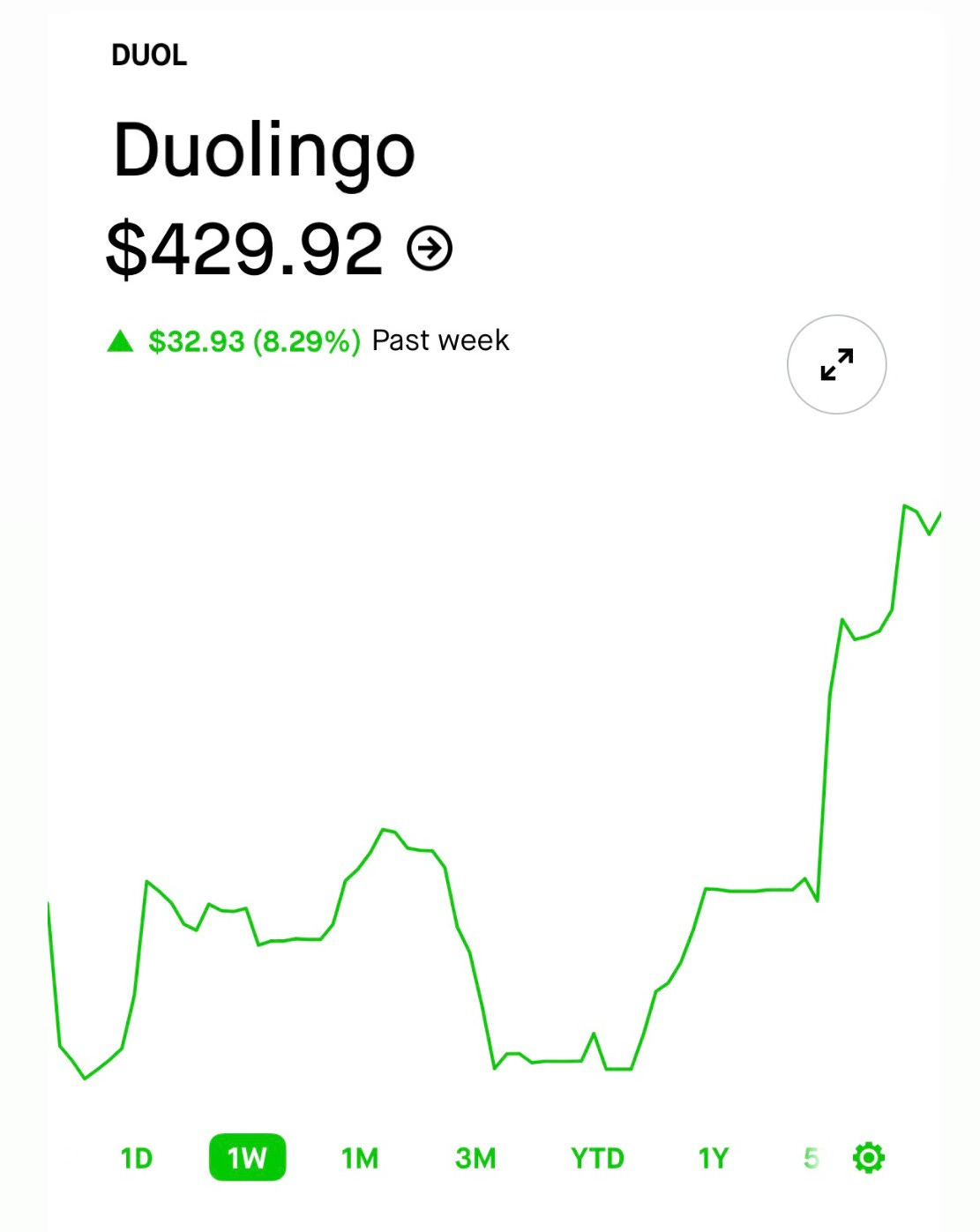Silence, Brand! Deep Dive: The KPI is Spectacle
🦀 When "Unhinged" Becomes Unacceptable: Duolingo’s Viral Marketing Crosses the Line
Suicide is not an edgy plot twist.
It’s not a meme.
And it is certainly not something to be casually woven into a marketing campaign designed to drive app downloads and social engagement.
Duolingo’s viral marketing has always thrived on chaos, absurdity, and internet-native humor. The brand has built an empire on being unhinged—but now, they’ve completely lost the plot.
From Viral Stunt to Marketing Disaster
Earlier this week, Duolingo took a page from the Mr. Peanut playbook and killed off their beloved—and feared—mascot. The brand issued a statement on their socials announcing that the cause of death was unknown but that an investigation was underway.
Unsurprisingly, Duo’s trademark snark was present throughout the statement, which quipped, “Tbh, he probably died waiting for you to do your lesson, but what do we know.” A funeral was held, where Duo—a person in an owl mask and lime body suit—was laid in a casket by two other characters and carted off via pickup truck.
 Tiktok failed to load.
Tiktok failed to load.Enable 3rd party cookies or use another browser
Of course, this was only the beginning.
Over the next 36 hours, the marketing stunt made national news headlines as brands, creators, and Dua Lipa all shared their condolences and speculations surrounding the bird’s mysterious demise.
A comment from @elfcosmetics reads, “pouring out a primer for our birdie baddie 😔🫗💋” while @subway summed up the general sentiment, simply saying, “chat what is going on.”
While originally popularized on Twitter with the rise of the unhinged brand voice, this type of outbound engagement has become a staple of brand social across the board.
Brand comments aren’t just about raking in tens of thousands of likes; they’re a wink from one social team to another, recognizing each other’s efforts in a way that benefits both accounts. While the public may see these interactions as spontaneous, the brand social community is actually quite tight-knit. Everyone knows everyone—and everyone knows Duolingo. With an industry leader launching a campaign so clearly engineered for virality, it’s obvious brands would leap into the conversation.
But then, Duolingo took it a step further.
When ‘Unhinged’ Stops Being Funny
In the most recent beat of this campaign, Duolingo heavily implies that its mascots have died by suicide with a post showing their characters sprawled on the floor with X’s over their eyes, set to a trending audio clip of someone singing, “I try not to kill myself.”
What started as a playful parody of exaggerated internet mourning has taken a turn that feels reckless, tasteless, and deeply out of touch.
Many viewers were left confused after watching the most recent video, with comment sections flooded with people trying to figure out who this was even for. Some compared the TikTok to Jonestown, while others expressed general discomfort at the bizarrely lighthearted treatment of apparent suicide.
Something about it just felt off, like a joke that had completely missed the mark.
The World Health Organization also posted a #RIPDuo tribute, further blurring the line between marketing and crisis. While certainly not intended to cause harm, it’s hard to ignore the uncomfortable timing: we are currently in the midst of a global bird flu outbreak that our government is trying to downplay.
Obviously, this campaign was not designed to suppress news, but it’s worth considering how viral engagement cycles can shift attention away from critical real-world crises—especially when the spectacle revolves around 'death,' 'murder,' and a literal bird during such an outbreak.
Suicide is a devastating public health crisis that affects millions, and reducing it to a punchline for social media clout is beyond irresponsible. According to the World Health Organization, more than 720,000 people die due to suicide every year. It is the third leading cause of death among 15–29-year-olds globally, and a Duolingo Blog post from 2022 states that around 60% of the app’s American users are under 30 (with the largest segment being 13–17-year-olds).
It feels like Duolingo is leaning into the same outrage-bait tactics that defined the Trump-era internet where keeping people talking is more important than what they're actually saying.
And honestly, this campaign only works because it’s Duo. If any other brand had tried this, people would have immediately clocked how wildly inappropriate it is. But because Duolingo has such a chokehold on digital culture, there’s a weird immunity. It doesn’t have to be a good campaign—it just has to be Duo.
Virality at Any Cost
The most shocking part?
This wasn’t an impulsive bad tweet. It was a full-fledged marketing campaign, planned, executed, and approved at multiple levels. A team of people saw this through, and at no point did anyone raise a flag. The ultimate question isn’t who approved it, but why marketing teams are becoming increasingly comfortable with escalating chaos into controversy.
This entire Duolingo situation highlights a growing problem in digital culture—spectacle over substance. The internet has flattened the value of attention to the point where even the most serious topics—suicide, mental health, human suffering—are just content fodder for viral moments. Brands are no longer trying to create meaningful engagement; the only currency left is spectacle, and they’re chasing shock value to get it.
And if there were any doubts about whether controversy pays, Duolingo’s stock has surged 10.27% in just two days (Yahoo! Finance), reaching its all-time high since this campaign began. No matter how tasteless the stunt, the spectacle always wins.
When the Hype Dies, What’s Left?
The consequences of normalizing suicide as a punchline extend beyond Duolingo’s engagement numbers. It perpetuates harmful narratives about mental health, trivializes the experiences of those who are struggling, and contributes to a culture where virality is prioritized over responsibility. This wasn’t just a marketing misstep—it was a failure to recognize the weight of the issue they were inadvertently trivializing.
Now, as the dust settles, it’s worth asking: are the brands and influencers who eagerly played along with this campaign going to regret it? Because when the spectacle fades, what’s left is a marketing stunt built on one of the darkest realities of human suffering.
And that is something no amount of engagement can justify.
Silence, Brand! is an internet culture and marketing newsletter compiled by unhinged brand marketing professionals—an elite army of internet idiots.
Thank you to this installment’s contributors: Benton Williams, Dayna Castillo, Lenny Leithauser, and














This was actually really difficult to write as someone w a 753 day streak on their app, but this being noted just shows that unhinged can indeed go too far.